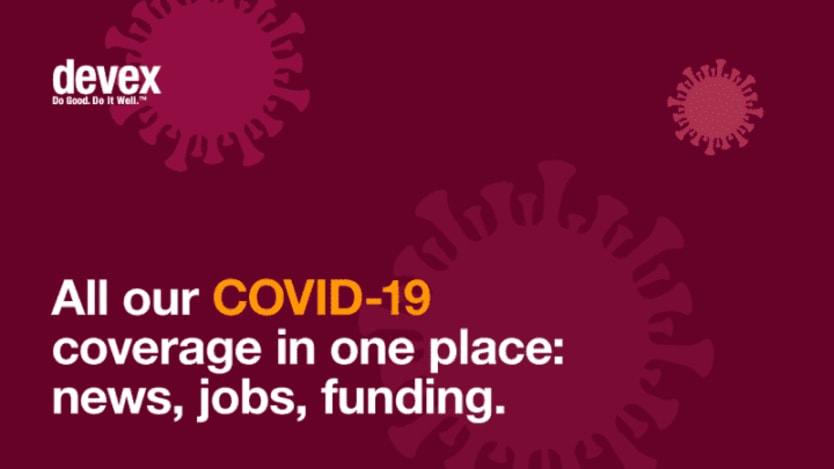
As governments around the world begin to implement COVID-19 lockdown exit plans, the world is slowly growing accustomed to our new reality under the pandemic. Everyone is at risk, but those who are marginalized — women and girls, the elderly, people with disabilities, people without insurance, people with compromised immune systems, and refugee populations — face even greater challenges.
Subscribe to our monthly newsletter on gender data
Devex, together with UN Women, look at how data is being used to inform policy and advocacy to advance gender equality.
We might imagine the virus to be akin to the aftermath of the 2004 Indian Ocean tsunami, or 2005 Hurricane Katrina, affecting women and men equally. And yet, more women than men died as a result of the tsunami due to cultural restrictions placing them at home with children, social mores that prevented many women from ever learning to swim, and traditional clothing that encumbered movement.
“COVID-19 demands a swift and concerted global response to contain the virus while also protecting the most vulnerable — placing women’s safety and women’s rights at the heart of the response.”
—I have spent my career as a humanitarian aid worker in insecure environments, supporting women to mitigate the risks they face in those settings — notably as a result of a more hidden global pandemic, violence against women. Everywhere I have worked — from Afghanistan to Mali to Haiti — women and girls suffer more. It does not matter whether this is due to a conflict, a natural disaster, or an epidemic.
For example, women in Ebola-affected countries were more vulnerable to the infection, and more greatly infected. Women did not have access to information that may have helped protect them from infection, and they were hardly engaged in the response.
Similarly, rates of violence against women grew exponentially in the aftermath of Hurricane Katrina, with rape crisis shelters reaching capacity. For many years afterward, affected communities faced extremely high rates of intimate partner violence due to lost livelihoods and prolonged insecurities.
And now, with the response to COVID-19, history is repeating itself. For many women, “stay at home” is a message that brings great risk. Intimate partner violence is the most common form of violence against women worldwide, and seeking shelter and safety from an abusive partner, difficult even in normal contexts, is practically impossible with new restrictions due to the pandemic.
Early statistics from China, Britain, France, and Spain find that as the lockdown took effect, reports of domestic abuse rose rapidly, limiting women’s right to live free from fear and violence — and to decide about their own bodies and lives.
It is not just freedom from harm that the global response to the pandemic has threatened, however. The response has dramatically impacted women’s right to access health care.
When children were forced to stay out of school due to Ebola, teenage pregnancy rates in Sierra Leone and Liberia increased dramatically. As we repeat the errors of Ebola, organizations such as Marie Stopes International are already projecting that around 9.5 million vulnerable women and girls risk losing access to contraception and safe abortion services, while condom manufacturers such as Karex warn of devastating shortages.
In the Arab region, nearly half of the female population of 84 million is not connected to the Internet nor has access to a mobile phone. This, coupled with alarming literacy rates — approximately 67% of women and 81% of men — means that women are disproportionately unable to access accurate information about the virus to help them prepare, respond, and survive.
If women are once again left out of leadership roles in the response to the pandemic, the patriarchal consolidation of power in these areas will have devastating effects on women’s rights, equality, and autonomy. In order to mitigate the risks, contain the current threat, and prevent future crises, we need a nonnegotiable feminist response to the virus. Policymakers must employ solutions that engage women from the genesis of their response and not as an afterthought.
We are now seeing an emerging common denominator in Germany, New Zealand, Taiwan, Iceland, Finland, Norway, and Denmark — countries with the lowest numbers of coronavirus cases and deaths, and the most robust responses to the virus. They all have female leaders.
There are emerging initiatives that we might learn from. For example, after sustained pressure from various groups, the U.K. government recently relaxed abortion laws, allowing women to take the abortion pill at home. Elsewhere in Europe, Germany and Denmark have continued with IVF treatments, using evidence-based clinical protocols to carry out treatment safely and responsibly. In other countries, delays in fertility services could deny many women the opportunity to have a biological child.
Fellow SheDecides Champion Marlène Schiappa, the French equality minister, has also spearheaded an initiative offering hope to women — subsidizing thousands of hotel rooms where survivors of intimate partner violence can quarantine without risk of harm. United Nations coronavirus response plans include measures such as setting up emergency warning systems in pharmacies, declaring shelters as essential services, and advocating against the release of prisoners with convictions linked to violence against women. However, none of these initiatives have received widespread uptake.
COVID-19 demands a swift and concerted global response to contain the virus while also protecting the most vulnerable — placing women’s safety and women’s rights at the heart of the response. Life will undoubtedly be different in the aftermath of the pandemic. And for the majority of women, their challenges do not end when the crisis is resolved. For women and girls, the crisis is just beginning.
Regardless of the pandemic, women and girls continue to have the right to safety, to information, to health care, to the full range of life options. We owe it to them to make this a reality.
Visit our dedicated COVID-19 page for news, job opportunities, and funding insights.









